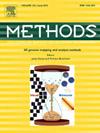Development of novel digital PCR assays for the rapid quantification of Gram-negative bacteria biomarkers using RUCS algorithm
IF 4.2
3区 生物学
Q1 BIOCHEMICAL RESEARCH METHODS
引用次数: 0
Abstract
Rapid and accurate identification of bacterial pathogens is crucial for effective treatment and infection control, particularly in hospital settings. Conventional methods like culture techniques and MALDI-TOF mass spectrometry are often time-consuming and less sensitive. This study addresses the need for faster and more precise diagnostic methods by developing novel digital PCR (dPCR) assays for the rapid quantification of biomarkers from three Gram-negative bacteria: Acinetobacter baumannii, Klebsiella pneumoniae, and Pseudomonas aeruginosa.
Utilizing publicly available genomes and the rapid identification of PCR primers for unique core sequences or RUCS algorithm, we designed highly specific dPCR assays. These assays were validated using synthetic DNA, bacterial genomic DNA, and DNA extracted from clinical samples. The developed dPCR methods demonstrated wide linearity, a low limit of detection (∼30 copies per reaction), and robust analytical performance with measurement uncertainty below 25 %. The assays showed high repeatability and intermediate precision, with no cross-reactivity observed. Comparison with MALDI-TOF mass spectrometry revealed substantial concordance, highlighting the methods’ suitability for clinical diagnostics.
This study underscores the potential of dPCR for rapid and precise quantification of Gram-negative bacterial biomarkers. The developed methods offer significant improvements over existing techniques, providing faster, more accurate, and SI-traceable measurements. These advancements could enhance clinical diagnostics and infection control practices.
利用 RUCS 算法开发用于快速量化革兰氏阴性菌生物标志物的新型数字 PCR 检测方法。
快速准确地鉴定细菌病原体对有效治疗和感染控制至关重要,尤其是在医院环境中。培养技术和 MALDI-TOF 质谱等传统方法往往耗时较长,灵敏度较低。为了满足对更快、更精确的诊断方法的需求,本研究开发了新型数字 PCR(dPCR)测定法,用于快速量化三种革兰氏阴性细菌的生物标记物:鲍曼不动杆菌、肺炎克雷伯氏菌和铜绿假单胞菌。利用可公开获得的基因组和针对独特核心序列或 RUCS 算法的 PCR 引物的快速鉴定,我们设计出了高度特异性的 dPCR 检测方法。我们使用合成 DNA、细菌基因组 DNA 和从临床样本中提取的 DNA 对这些检测方法进行了验证。所开发的 dPCR 方法具有宽线性、低检测限(每反应 30 个拷贝)和稳健的分析性能,测量不确定性低于 25%。检测结果显示出较高的重复性和中等精度,未发现交叉反应。与 MALDI-TOF 质谱法的比较显示,二者具有很高的一致性,凸显了该方法在临床诊断中的适用性。这项研究强调了 dPCR 在快速、精确定量革兰氏阴性细菌生物标记物方面的潜力。与现有技术相比,所开发的方法有了重大改进,可提供更快、更准确和可溯源的测量结果。这些进步可加强临床诊断和感染控制实践。
本文章由计算机程序翻译,如有差异,请以英文原文为准。
求助全文
约1分钟内获得全文
求助全文
来源期刊

Methods
生物-生化研究方法
CiteScore
9.80
自引率
2.10%
发文量
222
审稿时长
11.3 weeks
期刊介绍:
Methods focuses on rapidly developing techniques in the experimental biological and medical sciences.
Each topical issue, organized by a guest editor who is an expert in the area covered, consists solely of invited quality articles by specialist authors, many of them reviews. Issues are devoted to specific technical approaches with emphasis on clear detailed descriptions of protocols that allow them to be reproduced easily. The background information provided enables researchers to understand the principles underlying the methods; other helpful sections include comparisons of alternative methods giving the advantages and disadvantages of particular methods, guidance on avoiding potential pitfalls, and suggestions for troubleshooting.
 求助内容:
求助内容: 应助结果提醒方式:
应助结果提醒方式:


